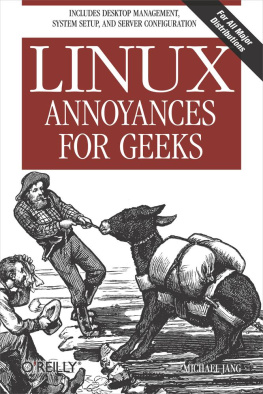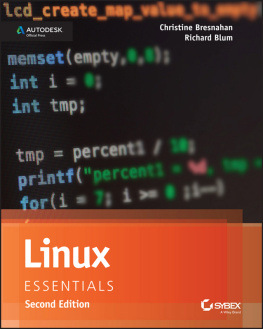To most of the world, all Linux users are geeks. But there are users who don't even realize that they're using Linux at work, and users who have recently installed Linux for the first time. On the other hand, there are users to whom everyone turns when they have a problem. We target this book to that group of experts to help them solve the annoyances they face on the job: finding the right hardware, configuring servers, supporting less experienced users, and more.
Linux Annoyances for Geeks provides a guide to many of the more common complaints faced by the experienced Linux user. Sometimes the annoyance comes directly from Linux, and sometimes from the adaptations required to support a regular user. The solutions are designed for three of the more prominent Linux distributions: Fedora Core, SUSE, and Debian. As Fedora Core serves as the test bed for Red Hat Enterprise Linux, many of the annoyances (and solutions) have also been tested for that distribution.
There are many other excellent Linux distributions. I wish I could have covered more. In writing this book, perhaps the biggest annoyance was the subtle differences in how things work (and how annoyances are solved) among distributions. As each distribution evolves, annoyances change. And too many details pertaining to different distributions would not be fair to those among us who are focused on a single distribution.
This book is an outgrowth of a long conversation with Andy Oram at the O'Reilly Open Source Convention. He was looking for a Linux equivalent to Windows XP Annoyances for Geeks , and I had the experience with the distributions on which he wanted a focus. He has been instrumental in shepherding this book from start to finish.
My own background includes administering, tinkering with, testing, and writing about a wide variety of Linux distributions. While studying for my MCSE, I started working with SUSE Linux, and I've been sold on open source ever since. While my RHCE certification has focused me on Red Hat distributions, I actually use Debian, and now Ubuntu Linux, as my primary home distributions.
Conventions Used in This Book
The following typographical conventions are used in this book:
ItalicIndicates new terms, URLs, email addresses, filenames, file extensions, and Linux utilities.
Constant widthIndicates the contents of files and the output from commands.
Constant width boldShows commands or other text that should be typed literally by the user. Also used to highlight portions of code
Constant width italicShows text that should be replaced with user-supplied values.
Tip
This icon signifies a tip, suggestion, or general note.
Warning
This icon indicates a warning or caution.
Organization of This Book
Linux Annoyances for Geeks is divided into three sections. , examine administrative annoyances related to servers, users, and more:
,
Configuring a Desktop EnvironmentProvides solutions for some of these everyday annoyances.
,
Configuring User WorkstationsGives some basic tips for less experienced users.
,
Optimizing Internet ApplicationsHelps the geek make Internet access as convenient and simple as possible for regular users.
,
Setting Up Local ApplicationsProvides solutions for the geek who needs to set up regular users with access to popular tools, such as PDF files, MP3 players, and Windows-based applications.
,
Installation AnnoyancesHelps the geek make choices in hardware, distributions, and systems that are appropriate for his or her users.
,
Basic Start ConfigurationHelps the geek optimize Linux, solve some annoying boot issues, and address some basic security concerns.
,
Kernel Itches and Other Configuration AnnoyancesFocuses primarily on those kernel-related tasks that make most Linux users look to the geek for help.
,
System MaintenanceFocuses on a variety of annoyances related to keeping your systems running smoothly and up-to-date.
,
Servicing ServersHelps you select and configure servers to solve a variety of problems, with a higher degree of security.
,
User ManagementFocuses on annoyances created by and associated with the presence of different kinds of users in an organization.
,
Administration TipsProvides solutions for a wide variety of other annoyances related to system administration.
Using Code Examples
This book is here to help you get your job done. In general, you may use the examples in this book in your own scripts and documentation. You do not need to contact us for permission unless you're reproducing a significant portion of the examples. For example, writing a program that uses several chunks of code from this book does not require permission. Selling or distributing a CD-ROM of examples from O'Reilly books does require permission. Answering a question by citing this book and quoting examples does not require permission. Incorporating a significant amount of examples from this book into your product's documentation does require permission.
We appreciate, but do not require, attribution. An attribution usually includes the title, author, publisher, and ISBN; for example: " Linux Annoyances for Geeks by Michael Jang. Copyright 2006 O'Reilly Media, Inc., 0-596-00801-5."
If you feel your use of examples falls outside fair use or the permission given above, feel free to contact us at .
Safari Enabled
When you see a Safari Enabled icon on the cover of your favorite technology book, that means the book is available online through the O'Reilly Network Safari Bookshelf.
Safari offers a solution that's better than e-books. It's a virtual library that lets you easily search thousands of top tech books, cut and paste code samples, download chapters, and find quick answers when you need the most accurate, current information. Try it for free at http://safari.oreilly.com.
How to Contact Us
Please address comments and questions concerning this book to the publisher:
| O'Reilly Media, Inc. |
| 1005 Gravenstein Highway North |
| Sebastopol, CA 95472 |
| 800-998-9938 (in the United States or Canada) |










